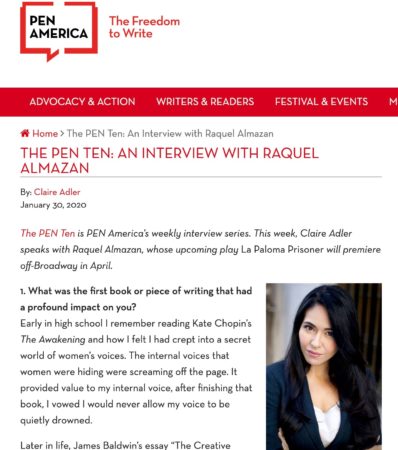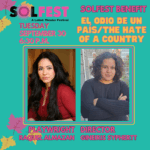Members of PEN America’s Prison and Justice Writing Program along with the Director of PEN America’s U.S. Free Expression program recently spoke with Raquel on the intersections between literary and political work and the issue of free expression.
In PEN America’s latest Works of Justice interview, artist Raquel Almazan discusses her play “La Paloma Prisoner,” her experience writing about incarcerated women of color, and the intersection of literature, free expression, and the fight for justice.
Read the interview HERE
Part of a collaboration between PEN America and the La Paloma Prisoner Project this interview is part of Works of Justice, an online series that features content connected to the PEN America Prison and Justice Writing Program, reflecting on the relationship between writing and incarceration and presenting challenging conversations about criminal justice in the United States.
This installment addresses Almazan’s journey of intersecting arts and justice initiatives. The La Paloma Prisoner Project includes programs designed to uplift the voices and narratives of current and formerly incarcerated women-identified folx of color through workshops/performances in prisons, conversation circles, advocacy and panel discussions leading up to the production’s scheduled run at NYTW starting April 19th, 2020.

Read the interview HERE
2nd interview series: “I believe there absolutely is a ‘writer’s identity,’ this is the heart of a writer’s positionality, their perspective, what shapes their unique choices in how they create or describe a world, a condition, an experience.” Read this week’s #PENTen interview with Raquel Almazan to hear more about how the interdisciplinary artist-activist believes identity interacts with creative processes and products. Raquel also shares book recommendations and more!
Raquel Almazán is an interdisciplinary artist, activist, and the Artistic Director of La Lucha Arts, an organization dedicated to transformational arts participation between communities, advocates, audiences and artists while building a platform for marginalized – abandoned narratives and people.





